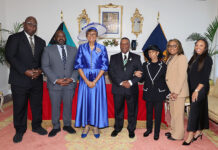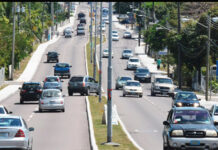Prime Minister the Rt. Hon. Hubert Ingraham, delivered in Bonn, Germany via video-recording at the launch of the Caribbean Challenge; Ninth Conference of the Parties (COP9) to the Convention on Biological Diversity in Bonn, Germany.
CLICK HERE TO LISTEN :pm_bonn_caribbeanchallenge2.wma
Remarks by
Rt. Hon. Hubert A. Ingraham
Prime Minister
Ladies and Gentlemen:
While I am unable to join you in person, I am with you in spirit, and I am pleased to assure you of the commitment of The Bahamas to join with like-minded states around the world in acting to protect biodiversity resources of global significance.
The Commonwealth of The Bahamas recognized early the need to establish, protect and preserve important biodiversity resources.
Next year represents the 50th anniversary of the first Marine Protected Area (MPA) in The Bahamas. The Exuma Cays Land and Sea Park is reputed to be the first of its kind in the world when established in 1959. It became an exclusive no-take area in 1986.
Current indicators show that the Exuma Park has become an important marine conservation area with ecological and economic benefits to The Bahamas well beyond the boundaries of the park.
Over time, the wisdom of expanding such conservation spaces gained support. In 2002 the size of our national park system was doubled and today includes 25 land and sea parks covering 1,094 square miles.
The importance of establishing parks and protected areas, not only for biodiversity conservation and preservation but also to mitigate climate change was recognized in The Bahamas First National Communication to the UNFCCC.
The current national parks system comprises approximately one per cent of our total land and marine area. These parks are managed by The Bahamas National Trust (BNT) which was created by Parliament in 1959 for the express purpose of promoting the preservation of terrestrial and marine areas for the benefit of The Bahamas.
Also in 2002, the Government approved the creation of an initial five Marine Protected Areas (MPA) in the north and central Bahamas.
Consultations with stakeholders, primarily residents of small fishing communities around our country are near conclusion; thereafter the formal delineation of the first five MPAs will be completed.
The Creek and Wetlands Initiative commenced in 1999. Forty creek systems countrywide were catalogued and inventoried for restoration, an important starting point for The Bahamas to manage effectively its creeks and wetlands.
Plans are underway further to expand the system of national parks and MPAs to include up to 20 per cent of the terrestrial and marine areas of the country.
A recently completed ecological gap assessment of The Bahamas has identified specialized areas of biodiversity and critical habitats which, when declared, will bring us to the 10 per cent mark sought under the Programme of Work on Protected Areas.
This will enable The Bahamas fully to meet its commitment to the Convention on Biological Diversity with respect to the establishment of protected areas.
We are similarly committed to facilitating and supporting the effective management of existing marine and existing terrestrial national parks and protected areas.
This will involve the continued support by the Government of environmentally sustainable activities including the implementation of environmentally sensitive policies, scientific research, conservation, education, habitat rehabilitation and the modernization of related legislation and regulation needed to support effective management of functioning protected areas.
Indeed, because we recognized the need to ensure sustainable, predictable and reliable financial support for conservation activities, The Bahamas Government in 1997 doubled its financial subvention to The Bahamas National Trust, doubled it again in 2006, and last year increased it tenfold to $1 million annually.
Additionally, this year, my Government has signalled its intent to provide additional direct financial support to the BNT for the engagement of necessary core staff required to manage the parks.
My Government’s commitment to preserve our marine and terrestrial environments and to meet the targets established by the UN Convention on Biological Diversity for 2010 and 2012 is clear.
Indeed, we fully expect to exceed our commitment effectively to conserve at least 20 per cent of the near-shore marine resources across The Bahamas by 2020.
It cannot be over-emphasized that sustainable financing is critical to The Bahamas and other countries of the Caribbean region in achieving our conservation goals. Many and varied funding mechanisms will have to be employed.
The Caribbean Challenge is one such initiative. Inspired by the Micronesian Challenge, the Caribbean Challenge seeks to ignite a region-wide initiative to raise millions in funding for conservation to be managed through a permanent Protected Area Trust Fund.
The Fund will be financed by a combination of private and public resources as well as through new funding mechanisms to be developed and implemented at the national level.
The creation of a Trust Fund secures private and public participation while creating institutions to channel environmental investment throughout the region.
This will permit the region to benefit from economies of scale for sustainable finance, assure transparency and strengthen local capacities.
By promoting the harmonization of conservation policies across the region it also strengthens our collective commitment to the protection of our shared marine resources.
The Caribbean Challenge supports the initiative to conserve, at a minimum, 10 per cent of the Caribbean’s terrestrial and marine habitat by 2010 and 2012 respectively.
It represents an unprecedented commitment by Caribbean governments to build political support and financial sustainability for protected areas in the Caribbean.
The Bahamas Government has committed $2 million dollars over the next four years for the establishment of The Bahamas National Protected Area Trust Fund. Funding has also been committed by the Nature Conservancy and other international funding agencies.
I call on other Caribbean Governments to accept this Challenge to conserve terrestrial and marine biodiversity throughout the region.
I especially encourage my regional colleague Heads of Government who have not yet done so, to take the necessary steps to implement the Challenge in their countries and to facilitate the establishment of sustainable funding arrangements for their national protected area systems.
I take this opportunity to thank our funding partners as well as the organizations in The Bahamas that have worked diligently and in collaboration with the Government to develop the Master Plan for the National Protected Area System and to make the Caribbean Challenge a reality.
We look forward to continued efforts, both nationally and regionally, to achieve the 2010 and 2012 goals of the Programme of Work on Protected Areas through partnership with these organizations and with other regional institutions including the Caribbean Community (Caricom), the Caribbean Environment Programme, and international institutions and agencies such as the Global Environment Facility, the United Nations Environment Programme (UNEP) and United Nations Development Programme (UNDP).
Ladies and Gentlemen:
I consider it an honour and a privilege to declare the Caribbean Challenge officially launched. I thank you and wish you a pleasant evening.








